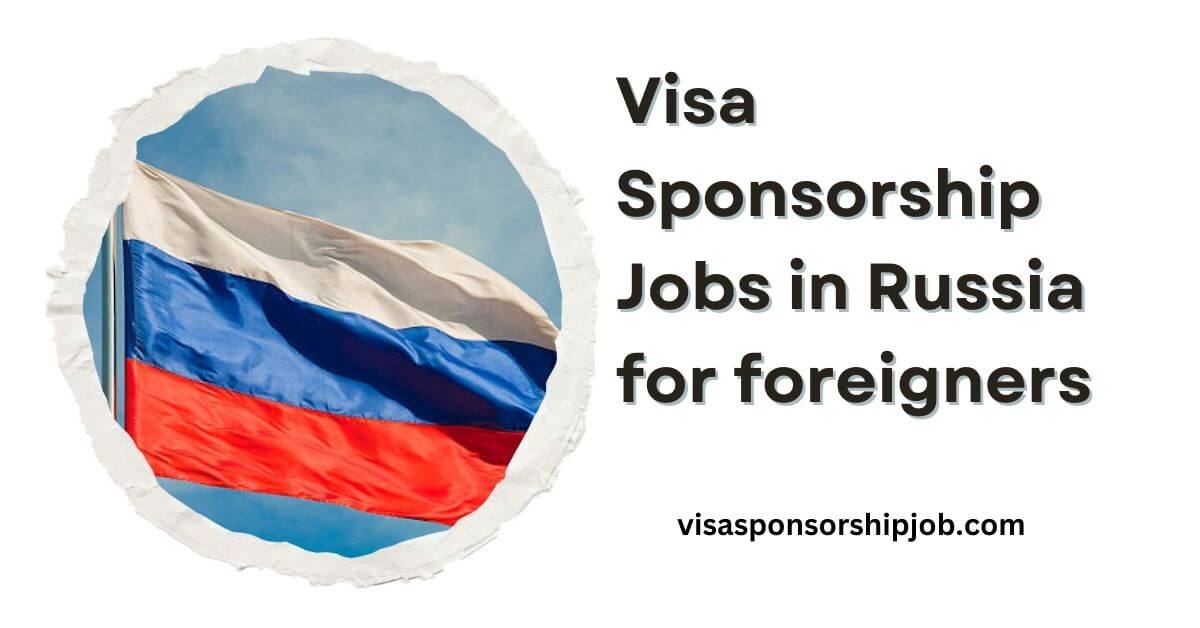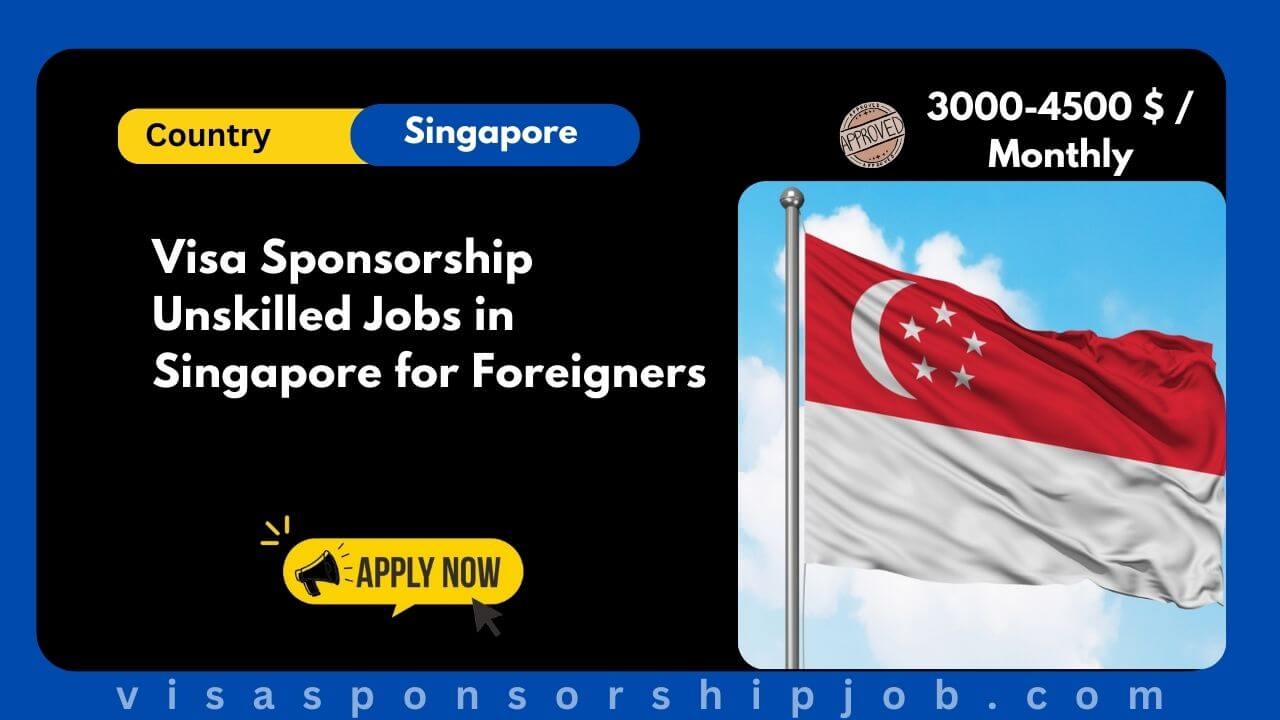The Russian labor market is diverse, and foreigners usually receive the best incomes among professionals. The best opportunities are in large cities like Moscow and St. Petersburg, especially for persons who speak both Russian and English. Retail, tourism, health care, and education are the major service sectors, employing more than half of all Russians. Mining, manufacturing, and construction are the three most important industrial sectors.
Do you need a work visa sponsorship in Russia as a foreigner? Do you need information and recommendations for foreigners looking for jobs in Russia, including positions available in Russian for English speakers? Do you want to know how to find work in Russia?
This article will present a list of Work visa sponsorship in Russia for foreigners, as well as information about Russian recruiting agencies, the Russian labor market, the Russian compensation structure, and much more.
Russian labor market and Visa Sponsorship jobs:
Moscow and St. Petersburg are Russia’s primary economic engines and places with the biggest job opportunities. Russia’s total unemployment rate was 6.3%. This represents an almost 30% increase since the beginning of the year, however, COVID-19’s effects are primarily to blame.
Moscow’s labor force contributes to over a quarter of Russia’s total GDP, and it has the highest employment rate in the country.
Check Also: Visa Sponsorship Farm Labourer Jobs in Finland – Apply Online
Visa Sponsorship Jobs in Russia for foreigners:
The following is a list of visa-sponsored job options for foreigners in Russia:
- Housekeeper – Room attendant
- Security alarms technician
- Babysitter/Nanny.
- Food Counter Attendant/Supervisor
- Server and Bartender.
- Front Desk Receptionist
- Warehouse and Production Roles
- Russian Localization Tester
- Spa Receptionist/ Assistant.
Benefits of Jobs:
- Employment Opportunities: Visa sponsorship provides access to job opportunities in Russia that would otherwise be unavailable to foreigners. It enables people to work legally and obtain experience in the Russian labor market.
- Income and Financial Stability: Working in Russia provides foreign employees with a source of income, which can lead to financial security and the ability to sustain themselves and their families.
- Cultural Experience: Living and working in Russia provides a one-of-a-kind cultural experience. Employees can become immersed in Russian culture, learn the language, and interact with individuals from various backgrounds.
- Skill Development: Many visa sponsorship employment may require particular skills or sectors, providing possibilities for professional development and the learning of new talents.
- International Exposure: Working in Russia provides foreign exposure and can improve a person’s resume, making them more competitive in the global employment market.
- Networking: Foreign workers in Russia can establish a network of local and international professional contacts, which can be beneficial to their careers.
- Access to Global Talent: Through visa sponsorship, Russian firms can gain access to a global talent pool. They can hire foreign nationals with specialized skills and competence that the local labor may lack.
- Diversity and Innovation: A varied workforce, including people from various countries and cultural backgrounds, can provide the organization with new insights and inventive ideas. This variety can boost creativity and problem-solving abilities.
- International Expansion: Having a staff that understands diverse markets and cultures through visa-sponsored employees can be a strategic benefit for organizations looking to expand internationally.
- Competitive Advantage: By providing visa sponsorship, an organization can become more appealing to qualified individuals from all over the world, giving them a competitive advantage in the talent market.
- Filling Skill Gaps: Visa-sponsored workers can contribute to the growth and competitiveness of certain industries or professions in Russia.
- Global Networking: Employers can profit from the international networks and connections brought by visa-sponsored staff, which can lead to new chances for partnerships and collaborations.
- Improved Reputation: Being known as an employer who encourages international talent can improve the organization’s reputation and make it an appealing destination for skilled workers.
Why is a work permit required?
Foreign travelers to the Russian Federation are subject to the Russian government’s stringent controls. As a result, if you want to work in Russia, you’ll need a Russian work permit visa. A valid Russian work permit grants you permission to live and work in the world’s largest country.
Recruitment Agencies in Russia:
Russian recruiting agencies are an excellent approach to finding Russian jobs. Most accept online registration and allow you to upload a Russian-specific CV. Some of the best recruitment agencies in Moscow and St. Petersburg are as follows:
- Lapa
- g-nous
- Texon
- Target Jobs
- Awara Group
- Global Vision
Russian employment language requirements:
Even if you don’t speak Russian, there are chances in Russia for both English and non-English speakers. However, these are frequently lower-level roles. Although top workers in international and global jobs may be non-Russian speakers on occasion, having great language abilities can significantly improve your employment prospects.
What occupation is most prevalent in Russia?
Around 6.6 million Russian men worked as drivers and mobile equipment operators, making this the most popular employment group for men aged 15 and up.
Work visa categories in Russia:
To be compliant, your employees must have both a visa and a Russian work permit. The following are the two visa options:
- Single-entry: This visa is only valid for one entry and is only valid for 90 days. The Russian Consulate will grant it based on a work visa invitation, which employees will get after obtaining a work permit.
- Multiple-entry: Multiple-entry visas are reissued by the Russian Migration Police local office based on the validity of the work permit.
Employees can also obtain Russian work licenses. Anyone from a non-Commonwealth of Independent States (CIS) country may apply for a standard work permit for the duration of the job contract. First, a temporary residency permit must be obtained. Skilled workers earning more than RUB 1 million per year are eligible for a work visa for highly qualified experts. It is processed more rapidly, has a three-year validity period, and allows family members to apply for Russian visas.
Work Visa Requirements for Russia:
As an employer, you are responsible for obtaining all work permits on behalf of your employees. When applying to the GUVM, you must bring the following documentation:
- A color passport photo.
- A valid passport or other form of identification.
- Copies of all qualifying certifications required
- A medical certificate stating that no illnesses exist.
- All fees must be paid in full.
As soon as the workers have their work authorization, the GUVM will issue them an invitation to apply for a work visa. Employees must provide the following information in addition to completing a work visa application:
- It is necessary to have a passport.
- Only one passport photo.
- The letter of invitation.
- A letter from you outlining the job, the work location, and the contract dates.
- It is necessary to have a medical certificate.
Work visa application process:
The first step in obtaining a Russian work visa is to complete the application and include a photo. You must also guarantee that your employees have passports that are valid for at least six months after they arrive in Russia. A letter of invitation should also be written for your team, describing their reason for visiting Russia as well as your offer to host them while you are there.
Due to the country’s additional restrictions on persons traveling with HIV/AIDS, all workers in the Russian Federation must schedule a doctor’s visit. All patients must be tested for leprosy, tuberculosis, and HIV/AIDS. Employees can apply for visas in person or through a travel agency, along with the results of recent medical exams. They will also have to pay the relevant fees depending on the type of visa they hold.
Important Factors to Consider:
After obtaining a work permit and visa, the employee will be permitted to work for you only. The name of your company should be included on the visa so that the government understands who your employees are. If you terminate an employment contract, the employee must leave the country and start the visa application process for a new employer all over again.
Vacancies for jobs in Russia:
Depending on your history, finding work in Russia may be challenging. English speakers have the choice of teaching English (other native language teaching jobs such as French or German are also accessible), working for a multinational firm in industries such as energy, finance, construction, or translation if multilingual.
The following industries are in high demand in Moscow:
- IT
- Business development
- Finance
- Human Resource Management
- Pharmaceutical and medical
In St. Petersburg, the following are in short supply:
- Engineers
- Professionals in sales
- Drivers
- Technical experts
Salary Structure in Russia:
- The Russian minimum wage is reviewed every six months, however, it does not always rise. It was raised to R12,130 per month.
- The average monthly Russian salary is somewhat more than R53000.00-56000.00 per month. In Moscow, however, wages are slightly higher, with many people earning more than R75,000 per month.
How to Get a Job in Russia:
There are numerous recruiting firms and job boards in Moscow and St. Petersburg. Nonetheless, they are best suited for highly qualified individuals who desire to work for larger organizations. Most of these businesses need you to submit your CV in English via email or on their website.
Another successful method for finding a job in Russia is to contact international corporations directly from your own country and check if they do business in Russia. Such companies are more inclined to hire foreigners in Russia.
For More Info:
Email Your CV, and We’ll Find the Best Pathway For you: info@visasponsorshipjob.com
Frequently Asked Questions:
Can I work in Russia as a foreigner?
Foreign citizens can lawfully work in Russia by obtaining a work permit or a patent. Failure to comply with the legislation results in significant fines for the company and the deportation of a foreign worker. A work permit is a document that verifies a foreign citizen’s permission to work in Russia.
How can I get PR in Russia?
With a temporary residence permit, you can get permanent residency in Russia after two years. Six months before the TRP expires, you should apply for a PRP. The Russian permanent residency permit has a five-year validity duration and can be extended indefinitely.
Is it easy to get a job in Russia?
I can assure you that getting a job in Russia is not difficult. Finding a job that pays becomes more challenging. If you are granted a work permit, you will be able to find work, but you will make approximately the same amount per month as you might in a day in London.






